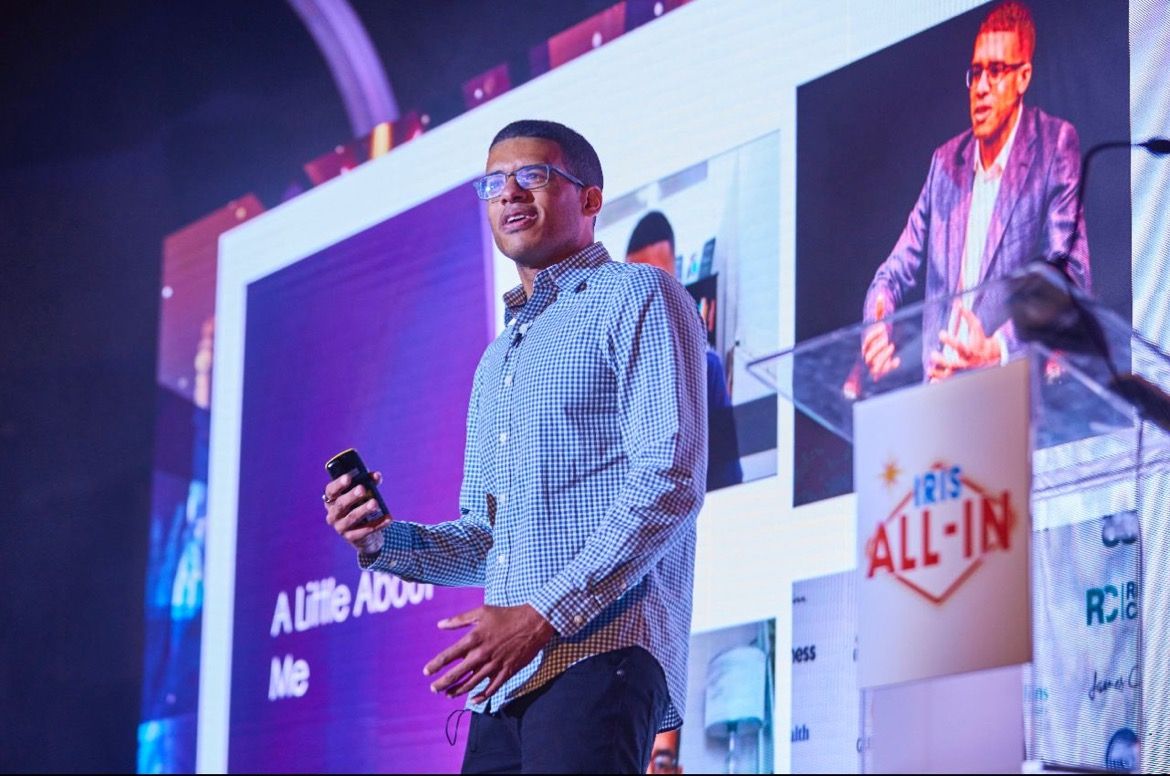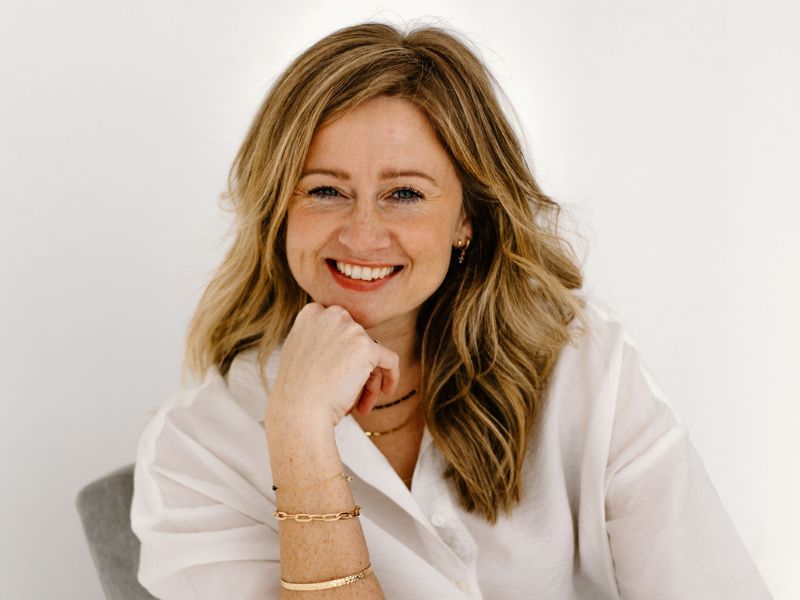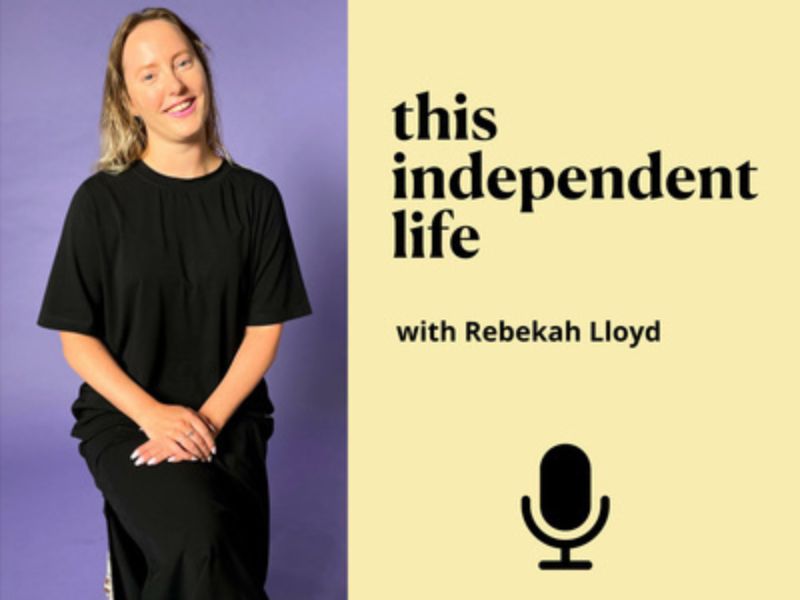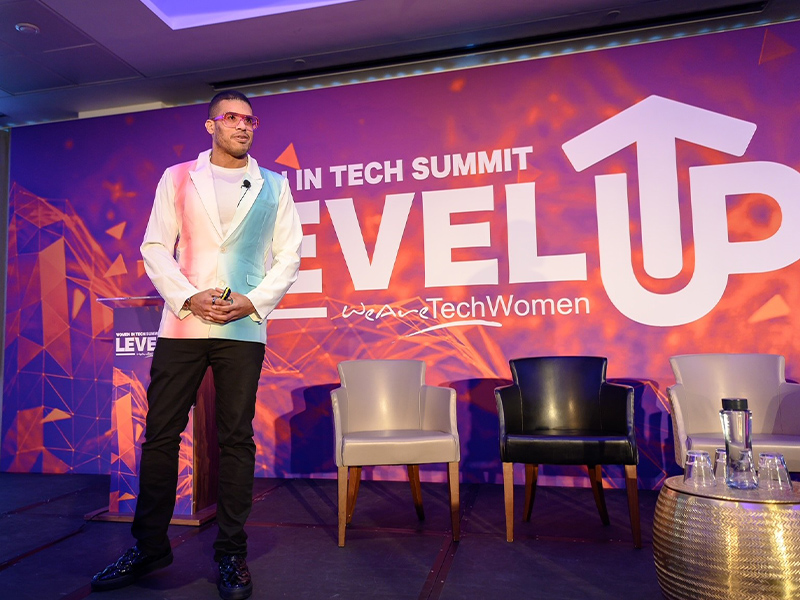Lee Chambers is a psychologist, coach and founder of Essentialise Workplace Wellbeing, a wellbeing and inclusion consultancy.
After a diverse career, including time in corporate finance, elite sports and the third sector, alongside scaling a videogame business, he has brought his knowledge and lived experience together to support companies in creating equitable culture, psychologically safe spaces and effective wellbeing strategies. This has been borne from his own lived experience, which has included mental health challenges, time as a stay at home Dad, and learning to walk again in 2014 after illness. He was the winner of the Great British Entrepreneur Award for service industries in 2021.
Tell us a bit about yourself, your background and your current role
I started life as something of a surprise to my parents, who were teenagers at the time when I was born. Brought up in Bolton, we started life on a council estate, but through my parent’s hard work I became the first family member to make it University. I fell out in my second year as my mental health degraded, but I managed to make it back a year later and graduated.
I secured a graduate scheme in financial risk, only to lose this due to the credit crunch in 2008. Starting from the desperation of my parent’s back bedroom, I grew a video game business to seven-figure revenue while still working 9-5 roles in local government and the third sector.
However, life was destined to take me in a different direction, and in 2014 my immune system failed, and I lost the ability to walk. Learning to walk again over 11 months, with my newborn daughter supporting me in her pram, gave me time to reflect, and after a number of years looking after my children before they started school, I decided I had to leave a legacy and make a positive impact.
And that takes me to today, as the founder of Essentialise Workplace Wellbeing, supporting organisations with wellbeing and inclusion strategy and bespoke training and interventions. Alongside this, I am a coach and mentor, an active male ally and a menopause champion. I am part of numerous social impact projects, Director of Wellbeing Lancashire and a Trustee of a dementia charity. And the phrase that sums up everything that I do; business brains for social gains.
Did you ever sit down and plan your career?
I would love to say I was prepared and planned every step I’ve taken, but I am very transparent about the squiggly career I have had so far and how most of it has been spontaneously grasping opportunities and learning as I go. I remember my dad working 12-hour shifts and my mum working three jobs just to keep my and my brothers having opportunities, and I’ve taken that work ethic as part of my thoughts on effort and exploration. Having had the career I thought disappear only six months in due to the recession, I’ve moved to a much more flexible approach, and that has worked for me. I even worked in elite sports for six months, transferring skills and seeing an opportunity to do something different. I do plan from a business perspective, but ask me what my 5-year plan is and I will tell you I have a loose vision that can flow with the uncertainty of life, and I find that keeps me scouting off the beaten path.
Have you faced any challenges along the way?
I’ve been through my fair share of challenges, but they have certainly made me wiser and more adaptable. The three biggest ones that are highlighted above have all tested me, especially having to learn to walk again and manage a chronic illness when my wife was pregnant and my son was only 18 months old. I put everything into being able to take my first steps with my daughter, and I managed to do that; it truly was a special moment, even though I haven’t beat her at much else since.
I’ve had other challenges too, including being told I was “too young, black and had an attitude problem” before starting my first business, and I found it impossible to gain funding and had to bootstrap it myself. I’ve had to deal with other instances of racism and call out behaviours, but I’ve always tried to brooch this in a way that presents an opportunity for learning and building awareness. I was recently diagnosed with autism, and this explains some of the challenges I’ve had with seeing the world differently, social communication and being naive, but I have an amazing support network, and every single challenge I’ve faced, I’ve never been alone.
What has been your biggest achievement to date?
I’m not one who celebrates as much as I should; I’m always looking for something else to disrupt and more impact that I can make. A few of the things I am proud of our building a successful business from scratch and exiting it, winning the Great British Entrepreneur Awards in 2021, being selected as a trustee of a charity with an amazing legacy, and of course, being one of the 2022 Rising Stars.
But ultimately, my biggest achievement is having two happy, healthy children, who I have a great bond with, who keep me playful and curious, and make me smile every day.
What one thing do you believe has been a major factor in you achieving success?
I’ve been asked this question a number of times, and it always comes back to one thing.
Curiosity.
I am endlessly curious, like an excitable child. I want to know how things work, Why people do what they do. Why did something fail. Why does society accept some things, but not others. Why do we have these structures that aren’t equitable. Everything is interconnected; there must be more than one solution.
Basically, I challenge others and invite them to challenge me. I look beyond common sense. I like to try experiments. I am hungry to learn. Being like a 7 year old is probably the biggest factor in me being relatively successful.
How do you feel about mentoring? Have you mentored anyone or are you someone’s mentee?
Mentoring is pivotal to creating a more equitable society and making a sustained impact. I had a bad experience with my first mentor, who instead of empowering and enabling me, focused on my weaknesses and left me feeling that I wasn’t made out to perform at a high level.
This meant for a number of years, I kept myself away from others, but that led me to becoming isolated, not having a sounding board and not having a critical friend. My second mentor, who I still work with today, is wonderful and has inspired me in more ways than I can articulate. And now I mentor a number of female STEM graduates, a group of Black-led social enterprises and at a SEND school in Lancashire.
I always think back to when I was younger, looking out for somebody who looked and sounded like me being a success in business and science, and never found a single role model I could relate to. Now, I want to be that role model too, alongside my formal and informal mentoring.
What can businesses/government/allies do to help diversity and inclusion?
I don’t think there’s enough space on this blog to share my thoughts on this. So I will keep it succinct. Some thoughts are:
- Getting curious and becoming aware of privilege and intersectionality.
- Committing to some challenging conversations and reflection.
- Working on the systems and structures that promote inequity, and avoid tokenism and performative allyship
- Creating psychologically safe spaces for expression and learning
- Build a collective understanding of microaggressions
- Pay those of lesser privilege for the work they do and have a budget that underpins an effective strategy
- Make a sustained effort to create inclusive recruitment processes and actively search and create opportunities for diverse talent.
There’s a whole lot more, but that just presents some food for thought!
Why do you think it’s important for men to support gender equality in the workplace?
If we look at it from a research perspective, gender inclusion initiatives are six times more likely to be effective if they engage men, in comparison to those that don’t have men engaged. To create lasting and sustained change, men need to be allies in the process and to unpack some of their privilege to understand why it’s important.
From a business perspective, it’s clear that having gender diversity across an organisation results in a whole range of benefits, from innovation to performance, agility to resilience. Many of the senior female leaders I’ve worked with have amazingly diverse skillsets and high competency, in part because of the barriers and obstacles they’ve had to scale and navigate through their career and society at large. Gender equality is a competitive edge that some organisations are completely blind too.
From a male perspective, I feel there is a bigger piece at play. The journey of becoming a male ally can be challenging, and can come with a range of emotions. But it does really bring into focus the importance of empathy and compassion, and many men need to foster this not only towards others, but towards themselves, given the challenges we face with male mental health.
And from societies perspective, things should be equitable and we have a long way to go. As a species, we’ve got some significant challenges, and if we are to continue to evolve and thrive, we need to move away from the dominance of male voices and come together to close the gap, as some of the brightest ideas often come from the quieter voices that haven’t been amplified. And that is a job for all of us, to dismantle societal, political and organisational systems that suppress and create platforms for underrepresented voices.
If you could give one piece of advice to your younger self, what would it be?
My one simple piece of advice would be not to worry so much; you will find a pathway to explore that will help you shape it as you go along. I didn’t really know what I wanted to become, and at times this left me feeling meaningless and confused.
But as I’ve been through my ups and downs, I’ve realised that you have to shape your own version of success and learn from your failures, while understanding what you enjoy and why, and what you dislike and why. Bringing all that together, you’ll find an underlying thread, and as I have done, something that I’m passionate about and is purposeful; empowering others, challenging the status quo and leaving little pieces of legacy with everything I do.
What is your next challenge and what are you hoping to achieve in the future?
I did say I had a loose 5-year vision! My next challenge is taking Essentialise to the next level with our platform and virtual reality training, allowing us to expand both our client base and our social impact work. I’m going to continue to inspire other male allies and take them on the journey with me, while giving the next generation the optimism of what’s possible.
My hopes for the future are simple. The seeds I’m sowing today will become the roots of the new systems and structure of an equitable society, the ripples I’m creating with other male allies will become a wave for the next generation of men to surf, and those I mentor will go on to achieve far more than I will.
And to make that lasting change, we need to come together to tackle something bigger than any single one of us. Long gone are the days of men being an island.
Because together, we rise.









